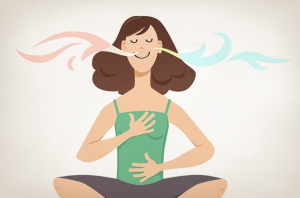Meditation for Depression
 What comes to mind when you think of someone meditating? Do you see an image of a calm, happy, serene person? Someone with a contented smile on their glowing face?
What comes to mind when you think of someone meditating? Do you see an image of a calm, happy, serene person? Someone with a contented smile on their glowing face?
If you are battling with depression, it is probably not the kind of image you have of yourself. Your symptoms of anxiety, hopelessness or low mood more than likely conjure an image of someone who looks sad and withdrawn. With your thoughts swirling around your head in a repeating loop, meditating may be the last thing on your mind.
Depression is characterized by negative thoughts1. It may be impossible for you to concentrate and making decisions can be difficult and stressful. You may find yourself brooding over problems that other people move swiftly past(2). Your thoughts are all doom and gloom. No matter how hard you try, you can’t find a way to handle your thoughts without getting caught up in a never-ending cycle of ifs, buts and maybes.
This is where meditation comes in. It may not be a cure for your depression, but is an extra tool in your treatment toolbox. It sits alongside therapy, medication, exercise and anything else you have tried to get on top of your mental health(3).
What is Meditation?
Meditation has been used by people around the world for centuries to help create a sense of inner calm. In the Western world it has been gaining popularity. It can help make it easier to take control of the stress we experience in our busy lives(4).
There are numerous styles of meditation including, mindfulness meditation(9), focus meditation and visualization or guided meditation(5). Mindfulness meditation is the style most commonly practiced. It helps you to bring awareness to your thoughts as they pass through your mind(6).
While meditating, thoughts are simply observed. There is no engagement with them. They are accepted at face value; there is no judgement. And then you let them go.
The opposite is true when it comes to the way thoughts are handled in a brain that is influenced by depression. There is an over-engagement with the thoughts that run through your mind. They are over analyzed and judged to be worthy or not.
The Benefits of Mindful Meditation for Depression
Meditation has been found to be useful in the management of depression. Research studies have shown that practicing mindfulness on a daily basis can disrupt negative thought patterns(7). By training your mind to recognize thoughts, accept them and allow them to move on while you are meditating you can stop negative thoughts in their tracks – or at least make them easier to deal with.
Regular meditation can make you more aware of your depression symptoms(8). By focusing inwards, you become better able to recognise the warning signs. Fatigue, low mood and feelings of hopelessness are less likely to creep up on you. You will be able to address them before they develop into a bigger problem. Mindfulness can prevent a relapse of a depressive episode.
Some scientific studies have even shown that mindful meditation can be more beneficial than exercise in managing depression. Knowing that exercise is a well recognized means of keeping depression at bay, that makes meditation a pretty powerful tool.
The act of meditating can be wonderfully calming, even for someone who has depression. It costs you nothing but time. When you practice meditation on a regular basis, the mental health rewards are priceless. A renewed sense of calm, greater self-awareness and the ability to take control of negative thoughts are yours for the taking.
References
1. Chahar Mahali S, Beshai S, Feeney J, Mishra S. Associations of negative cognitions, emotional regulation, and depression symptoms across four continents: International support for the cognitive model of depression. BMC Psychiatry. 2020;20(1).
2. What Is Depression? [Internet]. Psychiatry.org. 2021 [cited 21 October 2021]. Available from: https://www.psychiatry.org/patients-families/depression/what-is-depression
3. Khan A, Faucett J, Lichtenberg P, Kirsch I, Brown W. A Systematic Review of Comparative Efficacy of Treatments and Controls for Depression. PLoS ONE. 2012;7(7):e41778.
4. Sharma H. Meditation: Process and effects. AYU (An International Quarterly Journal of Research in Ayurveda). 2015;36(3):233.
5. Matko K, Ott U, Sedlmeier P. What Do Meditators Do When They Meditate? Proposing a Novel Basis for Future Meditation Research. Mindfulness. 2021;.
6. Wielgosz J, Goldberg S, Kral T, Dunne J, Davidson R. Mindfulness Meditation and Psychopathology. Annual Review of Clinical Psychology. 2019;15(1):285-316.
7. Ivtzan I, Young T, Martman J, Jeffrey A, Lomas T, Hart R et al. Integrating Mindfulness into Positive Psychology: a Randomised Controlled Trial of an Online Positive Mindfulness Program. Mindfulness. 2016;7(6):1396-1407.
8. Parmentier F, García-Toro M, García-Campayo J, Yañez A, Andrés P, Gili M. Mindfulness and Symptoms of Depression and Anxiety in the General Population: The Mediating Roles of Worry, Rumination, Reappraisal and Suppression. Frontiers in Psychology. 2019;10.
9. Alsaraireh F, Aloush S. Mindfulness Meditation Versus Physical Exercise in the Management of Depression Among Nursing Students. Journal of Nursing Education. 2017;56(10):599-604.
Join Our Community
Archives
- January 2023
- December 2022
- September 2022
- August 2022
- June 2022
- May 2022
- April 2022
- March 2022
- February 2022
- January 2022
- December 2021
- November 2021
- October 2021
- September 2021
- August 2021
- July 2021
- June 2021
- May 2021
- March 2021
- September 2020
- August 2020
- July 2020
- June 2020
- May 2020
- April 2020
- March 2020
- February 2020
Subscribe

Sign up to receive FREE toolkit
From Dr. Hyman, #1 NY Times & Amazon Author
We never spam or sell your e-mail





Follow Our Every Move